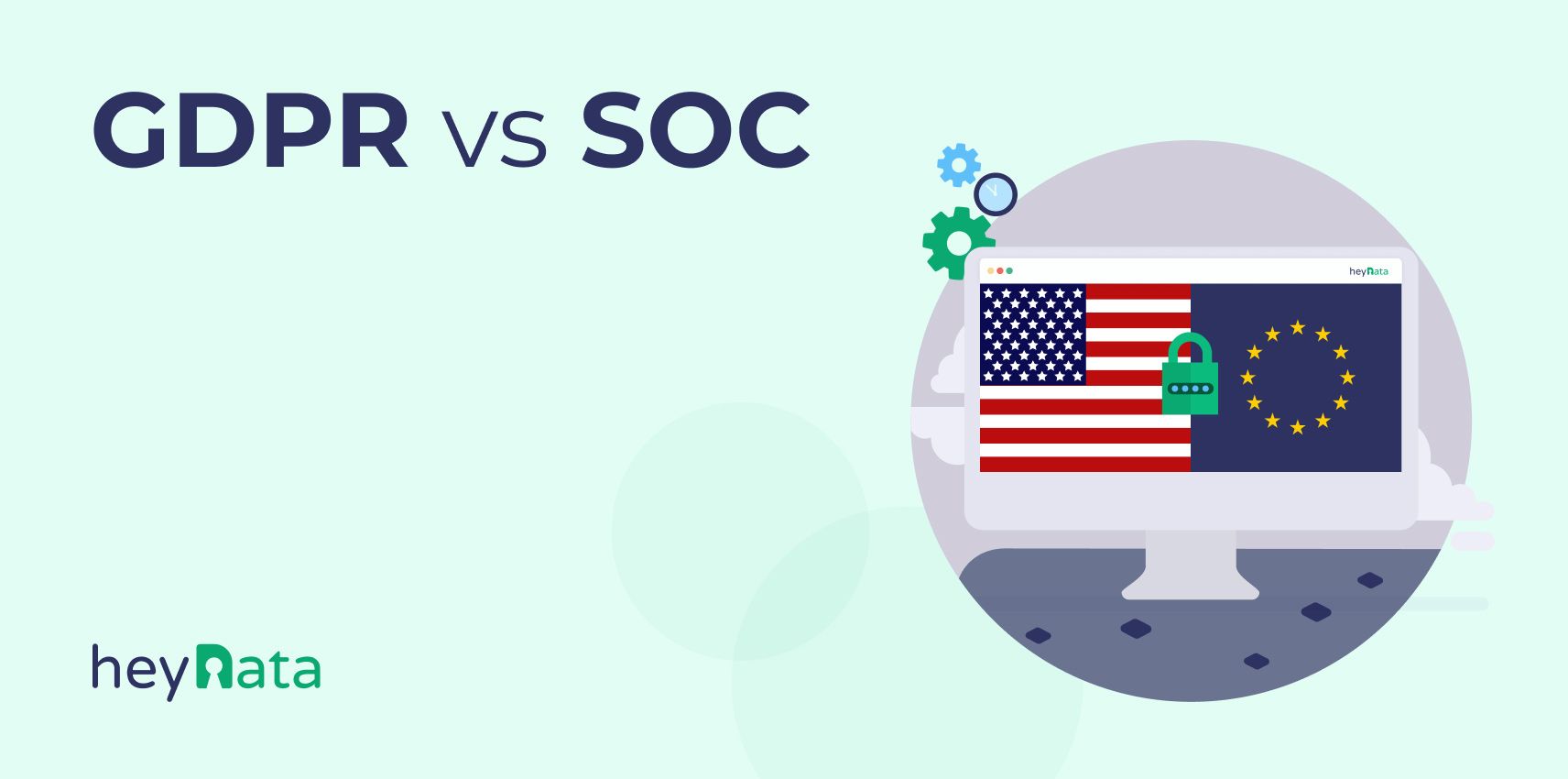
GDPR or SOC 2: Navigating the Seas of Compliance

In today's digital age, data security and privacy are the compass guiding organizations through uncharted waters. Two prominent frameworks, the General Data Protection Regulation (GDPR) in Europe and the Systems and Organization Controls 2 (SOC 2) in North America, serve as the lighthouse for companies striving to protect their valuable data.
Table of Contents:
What is GDPR?
Imagine GDPR as a powerful guardian, a European Union privacy regulation fiercely defending the privacy rights of individuals within the EU. This regulation extends its protection beyond EU borders, enveloping any international organization operating within EU territory. At its core, GDPR emphasizes the protection of personal data, demanding transparency and accountability.
What is SOC 2?
On the other side of the Atlantic, SOC 2, developed by the American Institute of Certified Public Accountants (AICPA), stands as a sentinel over customer data stored in the cloud. It primarily targets service organizations that process, store, or transmit customer data. SOC 2 is built upon five Trust Services Criteria (TSC): security, availability, processing integrity, confidentiality, and privacy.
For businesses already navigating the waters of SOC 2 compliance and eyeing the European market, mastering GDPR compliance is not just recommended but essential. While both frameworks aim to safeguard data, they have distinct differences. Let's break them down.
Key Differences
| GDPR – General Data Protection Regulation (Europe) | SOC 2 – System and Organization Controls 2 (North America) | |
| Scope | GDPR applies to the entire European Union (EU) and the European Economic Area (EEA). GDPR is a legal framework with mandatory compliance for organizations falling within its scope to protect individual data | SOC 2 applies to any service organization that stores, processes, or transmits any kind of customer data and is used primarily by North American companies. SOC 2 is a voluntary standard often pursued by service organizations to enhance their data security practices and build customer trust |
| Rights | GDPR grants individuals rights such as the right to access their data, the right to be forgotten, and the right to data portability. | Focuses on the rights of the organization's customers rather than individual data subjects. Customers have the right to trust that their data is handled securely and with confidentiality by the service organization. |
| Focus on privacy | The GDPR focuses on privacy and lays down strict rules on the requirements that must be kept to process personal data. | Privacy is just one aspect of the principles of SOC 2. Concerning privacy, the Generally Accepted Privacy Principles (GAPP) are used. The GAPP merely is a guide to help organizations address the business activities that involve collecting, creating, using, storing, and transmitting personal information of individuals. |
| Penalties | Non-compliance can result in fines of up to €20 million or 4% of the company's global annual revenue. | Non-compliance does not result in direct fines imposed by the framework itself. |
It's important to note that while SOC 2 is a voluntary standard often pursued by service organizations to enhance their data security practices and build customer trust, GDPR is a legal framework with mandatory compliance for organizations falling within its scope to protect individual data. Let’s delve into the distinctive features of each regulation.
GDPR
- Mandatory status: Mandatory for organizations processing personal data of individuals in the EU and EEA.
- Impact of non-compliance: This can result in significant fines, reputational damage, and legal consequences.
- Requirements: the lawful and transparent processing of personal data, with which a Data Protection Officer (DPO) or External DPO, can support you and whose appointment may be obligatory
SOC 2
- Mandatory status: Voluntary, but often pursued by service organizations, particularly those in the Software as a Service (SaaS) sector, to demonstrate commitment to data security.
- Impact of Non-Compliance: This may lead to a loss of customer trust, reputational damage, and challenges in securing partnerships, but no predefined financial penalties.
- Requirements: Independent third-party audits, often conducted by certified public accountants (CPAs).
Which Compliance to Choose?
| GDPR | SOC 2 |
|
For example: A Software as a Service (SaaS) company providing cloud-based HR solutions to businesses across North America must adhere to SOC 2 to assure their clients that their employee data is secure and managed with utmost integrity. |
Conclusion
In conclusion, while both GDPR and SOC 2 address data security and privacy, they have distinct scopes, requirements, and consequences. Organizations must carefully assess their operations, the nature of data they handle, and the geographical scope of their activities to determine whether GDPR, SOC 2, or both are applicable. Achieving compliance with these frameworks not only safeguards sensitive information but also enhances trust with customers in an era where data breaches and privacy concerns are prevalent. For businesses that have already implemented measures to comply with SOC 2 requirements, a solid foundation is likely in place for GDPR compliance as well. This facilitates a streamlined process and ensures a comprehensive approach to addressing both data security and privacy concerns.
If your business is eyeing expansion into the European market and you find yourself navigating the complexities of GDPR compliance, heyData is ready to play a key role as your dedicated compliance partner. Our expertise ensures seamless guidance through the intricacies of compliance within the EU.
heyData’s team of legal experts and digital software solution ensures that your operations align with the latest GDPR compliance regulations. We offer a streamlined approach to employee compliance training, periodic audits, and documentation management, bringing all these essential elements together in one unified hub.
Trust us to empower your business with a robust compliance strategy, providing a centralized solution for your organization's success in the EU.
Disclaimer: This document provides simplified information and does not constitute legal advice. Consult with legal professionals for specific compliance guidance.


